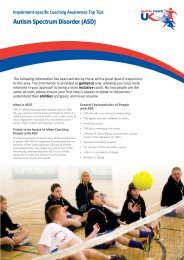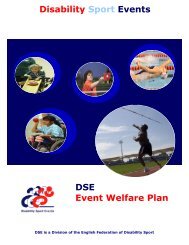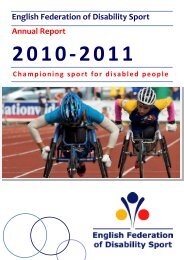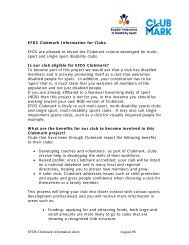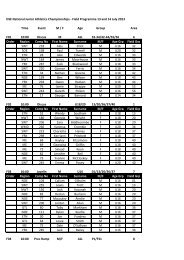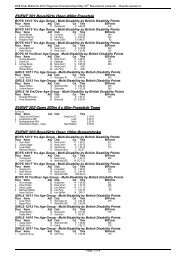(continued from p. 29)Age-old biases and low expectations with regardto children with disabilities should not stand inthe way <strong>of</strong> early childhood development. It isclear that with family and community supportfrom the earliest days <strong>of</strong> their lives, children withdisabilities are better placed to make the most <strong>of</strong>their school years and to prepare themselves foradulthood.Working with teachersTeachers are a – and perhaps the – key elementin a child’s learning environment, so it is importantthat they have a clear understanding <strong>of</strong>inclusive education and a strong commitmentto teaching all children.All too <strong>of</strong>ten, however, teachers lack appropriatepreparation and support in teaching childrenwith disabilities in regular schools. This is afactor in the stated unwillingness <strong>of</strong> educatorsin many countries to support the inclusion <strong>of</strong>children with disabilities in their classes. 75 Forexample, one study <strong>of</strong> prospective teachers<strong>of</strong> special education in Israel found they heldunhelpful preconceptions about people with disabilities,and that some discriminated betweendifferent types <strong>of</strong> disability. 76 Resources forchildren with disabilities tend to be allocated tosegregated schools rather than to an inclusivemainstream education system. This can provecostly as well as inappropriate: In Bulgaria, thebudget per child educated in a special schoolcan be up to three times higher than that for asimilar child in a regular school. 77A review <strong>of</strong> the situation <strong>of</strong> children with intellectualdisabilities in 22 European countrieshighlighted the lack <strong>of</strong> training <strong>of</strong> regular teachersto work with children with disabilities as amajor concern. Most <strong>of</strong> the time, these studentswere taught by support staff rather than certifiedteachers. Teacher training has proved effective infostering commitment to inclusion. A 2003 studyfound that school principals who had taken morecourses on disability expressed more inclusiveviews. And shifting attitudes benefit students:Positive views on inclusion translated into lessrestrictive placements for specific students withdisabilities. 78 Another study from 2001 found thata course on inclusion for those studying to beteachers was effective in changing their attitudes,so that they favoured including children withmild disabilities in the classroom. 79The greatest opportunity appears to exist amongteachers who are still fresh in the pr<strong>of</strong>ession. Arecent systematic literature review <strong>of</strong> countries asdiverse as China, Cyprus, India, Iran, the Republic<strong>of</strong> Korea, the State <strong>of</strong> Palestine, the United ArabEmirates and Zimbabwe found that teachers withthe least general teaching experience had morepositive attitudes than those with longer service.Teachers who had received training in inclusiveeducation had more positive attitudes than thosewho had received no training, and those who hadthe most positive attitudes were those with actualexperience <strong>of</strong> inclusion. 80Yet pre-service training rarely prepares teachersto teach inclusively. Where training exists,it is <strong>of</strong> variable quality. Although numeroustoolkits exist, these are not always geared to aspecific context, and so will frequently containforeign concepts. Group learning is one example.Teachers have responded negatively to pictures<strong>of</strong> children with and without disabilities seated ingroups, as this is at odds with the way studentsinteract in more traditional classrooms. 81Another challenge is the lack <strong>of</strong> diversity amongteaching personnel. Teachers with disabilitiesare quite rare and in some settings considerableobstacles exist for adults with disabilities to qualifyas teachers. In Cambodia, for example, the lawstates that teachers must be “free <strong>of</strong> disabilities.” 82Partnerships with civil society are providingencouraging examples <strong>of</strong> ways to enhanceteacher training and diversity. In Bangladesh, theCentre for <strong>Disability</strong> in Development (CDD), anational non-governmental organization (NGO),employs a group <strong>of</strong> inclusive education trainerswho run 10-day training sessions during school32THE STATE OF THE WORLD’S CHILDREN 2013: Children with Disabilities
terms for 20 schools at a time, with training providedto one teacher from each school. 83 Several<strong>of</strong> the CDD trainers are visually impaired or haveother disabilities, so they are important rolemodels for teachers and students with and withoutdisabilities. And in Mozambique, Ajuda deDesenvolvimento de Povo para Povo, a nationalNGO, has worked closely with the national disabledpeople’s organization known as ADEMO totrain student teachers to work with children withdisabilities and to train student teachers whohave disabilities. 84Teachers tend to work in isolation, which meansthey are <strong>of</strong>ten unsupported in the classroom,and are <strong>of</strong>ten under pressure to complete a narrowsyllabus imposed from above. Inclusiveeducation requires a flexible approach to schoolorganization, curriculum development and pupilassessment. Such flexibility would allow forthe development <strong>of</strong> a more inclusive pedagogy,shifting the focus from teacher-centred to childcentredto embrace diverse learning styles.Parents can play many roles, from providingaccessible transport to raising awareness, gettinginvolved in civil society organizations andliaising with the health sector so that childrenhave access to appropriate equipment and supportand with the social sectors to access grantsand credit schemes to reduce poverty. In manycountries, schools have community committeesthat are engaged in a wide range <strong>of</strong> activitiesto support inclusion. For example, in Viet Nam,Community Steering Committees have beeninvolved in advocacy, local training, securingassistive devices, providing financial supportand developing accessible environments. 87 It isimportant that parents and community membersrealize that they have contributions to make andthat their contributions are used.Although the importance <strong>of</strong> child participationand child agency is well documented, they situncomfortably within the existing structures and(continued on p. 36)Teachers need to be able to call on specialist helpfrom colleagues who have greater expertise andexperience <strong>of</strong> working with children with disabilities,especially children with sensory or intellectualimpairments. For example, specialists canadvise on the use <strong>of</strong> Braille or computer-basedinstruction. 85 Where such specialists are relativelyfew, they can travel between schools as needed.Even these itinerant specialist teachers can be inshort supply in such low-income areas as sub-Saharan Africa. 86 This presents an opportunity forappropriate support from providers <strong>of</strong> financialand technical assistance from the internationalto the local level.Involving parents, communitiesand childrenInclusive education programmes that focus onlyon classroom practices fail to harness parents’potential to contribute to inclusive education –and to prevent such violations as the confinement<strong>of</strong> children with disabilities to separate rooms.Boys play football at the Nimba Centre in Conakry, Guinea.The centre provides training for people with physicaldisabilities. © UNICEF/HQ2010-1196/AsselinA STRONG FOUNDATION33





